Jadan earns a yearly base salary of $30,000 plus a commission of $500 on every car he sells above his monthly minimum of two cars. Last year, Jaden met or surpassed his minmum sales every month, and earned a total income (salary plus commission) of $60,000.
Quantity AQuantity BThe number of cars Jaden90sold last year
The correct Answer is:Quantity B is greater.
Step by step video, text & image solution for Jadan earns a yearly base salary of $30,000 plus a commission of $500 on every car he sells above his monthly minimum of two cars. Last year, Jaden met or surpassed his minmum sales every month, and earned a total income (salary plus commission) of $60,000. {:("Quantity A","Quantity B"),("The number of cars Jaden",90),("sold last year",):} by Maths experts to help you in doubts & scoring excellent marks in Class 12 exams.
Similar Questions
The Physician Assistant Will See You Now
23 The term “paramedics” refers to health care workers who provide routine and clinical services.–––––––––––––––––––––––––––––––––––––––––––––––––––––––––––––––––––––––––––––––––––––––––––––––––––––– While the pressures of an aging population, insurance reforms, and health epidemics have increased demand for care, the supply of physicians is not expected to 24 keep pace.––––––––––– The Association of American Medical Colleges predicts a shortage of over 90,000 physicians by 2020, by 2025, that number could climb to more than 130,000. In some parts of the country, shortages are already a sad fact of life. A 2009 report by the Bureau of Health Professions notes that although a fifth of the US population lives in rural areas, less than a tenth of US physicians serves that population. Because a traditionalist response to the crisis— 25 amping up–––––––––––– medical-college enrollments and expanding physician training programs—is too slow and costly to address the near-term problem, alternatives are being explored. One promising avenue has been greater reliance on physician assistants (PAs).
26 By virtue of 27 there–––––– medical training, PAs can perform many of the jobs traditionally done by doctors, including treating chronic and acute conditions, performing minor 28 surgeries: and––––––––––––––– prescribing some medications. However, although well 29 compensated earning in 2012 a median annual salary of $90,930,––––––––––––––––––––––––––––––––––––––––––––––––––––––––––––––––––––– PAs cost health care providers less than do the physicians who might otherwise undertake these tasks. Moreover, the training period for PAs is markedly shorter than 30 those for–––––––––– physicians—two to three years versus the seven to eleven required for physicians.
Physician assistants already offer vital primary care in many locations. Some 90,000 PAs were employed nationwide in 2012. Over and above their value in partially compensating for the general physician shortage has been their extraordinary contribution to rural health care. A recent review of the scholarly literature by Texas researchers found that PAs lend cost-efficient, widely appreciated services in underserved areas. 31 In addition,––––––––––––– rural-based PAs often provide a broader spectrum of such services than do their urban and suburban counterparts, possibly as a consequence of the limited pool of rural-based physicians.
Increasingly, PAs and other such medical practitioners have become a critical complement to physicians. A 2013 RAND Corporation report estimates that while the number of primary care physicians will increase slowly from 2010 to 2025, the number of physician assistants and nurse-practitioners in primary care will grow at much faster rates. 32 Both by merit and from necessity, PAs are likely to greet more 33 patience than––––––––––––––– ever before.
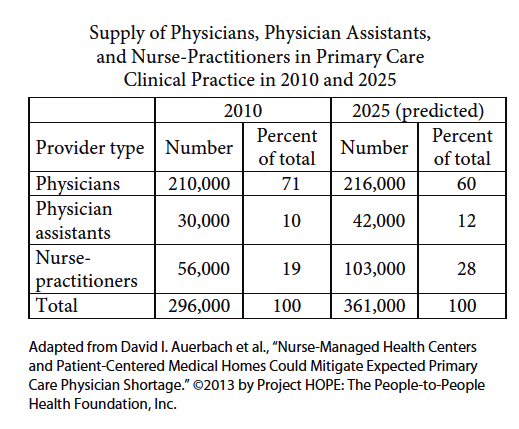 View Solution
View SolutionThe Physician Assistant Will See You Now
23 The term “paramedics” refers to health care workers who provide routine and clinical services.–––––––––––––––––––––––––––––––––––––––––––––––––––––––––––––––––––––––––––––––––––––––––––––––––––––– While the pressures of an aging population, insurance reforms, and health epidemics have increased demand for care, the supply of physicians is not expected to 24 keep pace.––––––––––– The Association of American Medical Colleges predicts a shortage of over 90,000 physicians by 2020, by 2025, that number could climb to more than 130,000. In some parts of the country, shortages are already a sad fact of life. A 2009 report by the Bureau of Health Professions notes that although a fifth of the US population lives in rural areas, less than a tenth of US physicians serves that population. Because a traditionalist response to the crisis— 25 amping up–––––––––––– medical-college enrollments and expanding physician training programs—is too slow and costly to address the near-term problem, alternatives are being explored. One promising avenue has been greater reliance on physician assistants (PAs).
26 By virtue of 27 there–––––– medical training, PAs can perform many of the jobs traditionally done by doctors, including treating chronic and acute conditions, performing minor 28 surgeries: and––––––––––––––– prescribing some medications. However, although well 29 compensated earning in 2012 a median annual salary of $90,930,––––––––––––––––––––––––––––––––––––––––––––––––––––––––––––––––––––– PAs cost health care providers less than do the physicians who might otherwise undertake these tasks. Moreover, the training period for PAs is markedly shorter than 30 those for–––––––––– physicians—two to three years versus the seven to eleven required for physicians.
Physician assistants already offer vital primary care in many locations. Some 90,000 PAs were employed nationwide in 2012. Over and above their value in partially compensating for the general physician shortage has been their extraordinary contribution to rural health care. A recent review of the scholarly literature by Texas researchers found that PAs lend cost-efficient, widely appreciated services in underserved areas. 31 In addition,––––––––––––– rural-based PAs often provide a broader spectrum of such services than do their urban and suburban counterparts, possibly as a consequence of the limited pool of rural-based physicians.
Increasingly, PAs and other such medical practitioners have become a critical complement to physicians. A 2013 RAND Corporation report estimates that while the number of primary care physicians will increase slowly from 2010 to 2025, the number of physician assistants and nurse-practitioners in primary care will grow at much faster rates. 32 Both by merit and from necessity, PAs are likely to greet more 33 patience than––––––––––––––– ever before.
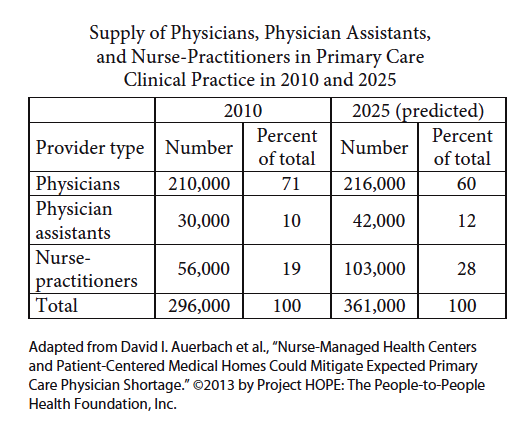
Which choice is the best introduction to the paragraph?View Solution
Knowledge Check
- Question 1 - Select One
Ashwin wants to buy a car and plans to take loan from a bank for his car. He repays his total loan of Rs. 1,18,000 by paying every month starting with the first instalment of Rs.1,000. If he increases the instalment by Rs.100 every month, answer the following:
If total installments are 40, then the amount paid by him in the last installment is:ARs.4,900BRs.3,900CRs.5,900DRs.9,400 - Question 2 - Select One
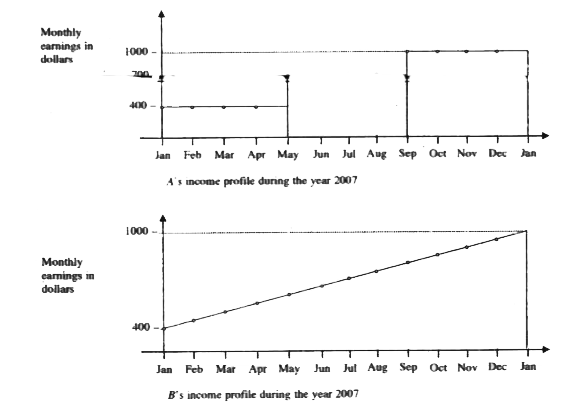
A launched 3 products in the year 2007 and earns income from the sales of the products only. The top graph shows his monthly earning for the year B's earning consist of continuously growing salary growing by same amount each month as shown if the figure. Which one of the following equal the total earning of A and B in the year 2007?A7500, 8100B7850, 8300C8150, 8400D8400, 8100 - Question 3 - Select One
The Physician Assistant Will See You Now
23 The term “paramedics” refers to health care workers who provide routine and clinical services.–––––––––––––––––––––––––––––––––––––––––––––––––––––––––––––––––––––––––––––––––––––––––––––––––––––– While the pressures of an aging population, insurance reforms, and health epidemics have increased demand for care, the supply of physicians is not expected to 24 keep pace.––––––––––– The Association of American Medical Colleges predicts a shortage of over 90,000 physicians by 2020, by 2025, that number could climb to more than 130,000. In some parts of the country, shortages are already a sad fact of life. A 2009 report by the Bureau of Health Professions notes that although a fifth of the US population lives in rural areas, less than a tenth of US physicians serves that population. Because a traditionalist response to the crisis— 25 amping up–––––––––––– medical-college enrollments and expanding physician training programs—is too slow and costly to address the near-term problem, alternatives are being explored. One promising avenue has been greater reliance on physician assistants (PAs).
26 By virtue of 27 there–––––– medical training, PAs can perform many of the jobs traditionally done by doctors, including treating chronic and acute conditions, performing minor 28 surgeries: and––––––––––––––– prescribing some medications. However, although well 29 compensated earning in 2012 a median annual salary of $90,930,––––––––––––––––––––––––––––––––––––––––––––––––––––––––––––––––––––– PAs cost health care providers less than do the physicians who might otherwise undertake these tasks. Moreover, the training period for PAs is markedly shorter than 30 those for–––––––––– physicians—two to three years versus the seven to eleven required for physicians.
Physician assistants already offer vital primary care in many locations. Some 90,000 PAs were employed nationwide in 2012. Over and above their value in partially compensating for the general physician shortage has been their extraordinary contribution to rural health care. A recent review of the scholarly literature by Texas researchers found that PAs lend cost-efficient, widely appreciated services in underserved areas. 31 In addition,––––––––––––– rural-based PAs often provide a broader spectrum of such services than do their urban and suburban counterparts, possibly as a consequence of the limited pool of rural-based physicians.
Increasingly, PAs and other such medical practitioners have become a critical complement to physicians. A 2013 RAND Corporation report estimates that while the number of primary care physicians will increase slowly from 2010 to 2025, the number of physician assistants and nurse-practitioners in primary care will grow at much faster rates. 32 Both by merit and from necessity, PAs are likely to greet more 33 patience than––––––––––––––– ever before.
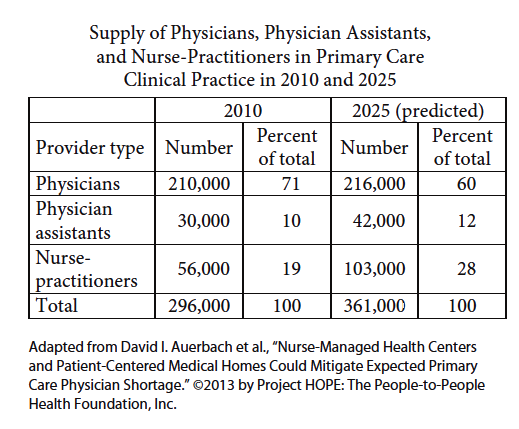 ANO CHANGEBmaintain the tempo.Cget in line.Dmove along.
ANO CHANGEBmaintain the tempo.Cget in line.Dmove along.
The Physician Assistant Will See You Now
23 The term “paramedics” refers to health care workers who provide routine and clinical services.–––––––––––––––––––––––––––––––––––––––––––––––––––––––––––––––––––––––––––––––––––––––––––––––––––––– While the pressures of an aging population, insurance reforms, and health epidemics have increased demand for care, the supply of physicians is not expected to 24 keep pace.––––––––––– The Association of American Medical Colleges predicts a shortage of over 90,000 physicians by 2020, by 2025, that number could climb to more than 130,000. In some parts of the country, shortages are already a sad fact of life. A 2009 report by the Bureau of Health Professions notes that although a fifth of the US population lives in rural areas, less than a tenth of US physicians serves that population. Because a traditionalist response to the crisis— 25 amping up–––––––––––– medical-college enrollments and expanding physician training programs—is too slow and costly to address the near-term problem, alternatives are being explored. One promising avenue has been greater reliance on physician assistants (PAs).
26 By virtue of 27 there–––––– medical training, PAs can perform many of the jobs traditionally done by doctors, including treating chronic and acute conditions, performing minor 28 surgeries: and––––––––––––––– prescribing some medications. However, although well 29 compensated earning in 2012 a median annual salary of $90,930,––––––––––––––––––––––––––––––––––––––––––––––––––––––––––––––––––––– PAs cost health care providers less than do the physicians who might otherwise undertake these tasks. Moreover, the training period for PAs is markedly shorter than 30 those for–––––––––– physicians—two to three years versus the seven to eleven required for physicians.
Physician assistants already offer vital primary care in many locations. Some 90,000 PAs were employed nationwide in 2012. Over and above their value in partially compensating for the general physician shortage has been their extraordinary contribution to rural health care. A recent review of the scholarly literature by Texas researchers found that PAs lend cost-efficient, widely appreciated services in underserved areas. 31 In addition,––––––––––––– rural-based PAs often provide a broader spectrum of such services than do their urban and suburban counterparts, possibly as a consequence of the limited pool of rural-based physicians.
Increasingly, PAs and other such medical practitioners have become a critical complement to physicians. A 2013 RAND Corporation report estimates that while the number of primary care physicians will increase slowly from 2010 to 2025, the number of physician assistants and nurse-practitioners in primary care will grow at much faster rates. 32 Both by merit and from necessity, PAs are likely to greet more 33 patience than––––––––––––––– ever before.
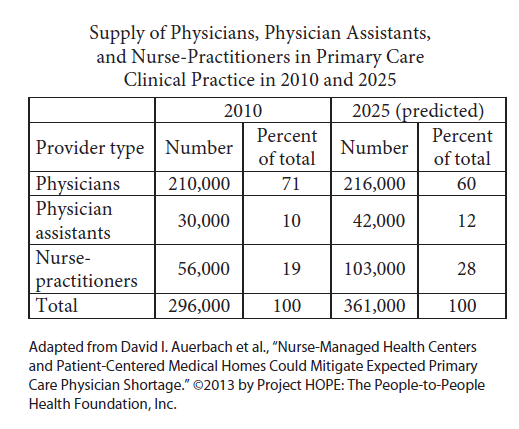 View Solution
View SolutionThe Physician Assistant Will See You Now
23 The term “paramedics” refers to health care workers who provide routine and clinical services.–––––––––––––––––––––––––––––––––––––––––––––––––––––––––––––––––––––––––––––––––––––––––––––––––––––– While the pressures of an aging population, insurance reforms, and health epidemics have increased demand for care, the supply of physicians is not expected to 24 keep pace.––––––––––– The Association of American Medical Colleges predicts a shortage of over 90,000 physicians by 2020, by 2025, that number could climb to more than 130,000. In some parts of the country, shortages are already a sad fact of life. A 2009 report by the Bureau of Health Professions notes that although a fifth of the US population lives in rural areas, less than a tenth of US physicians serves that population. Because a traditionalist response to the crisis— 25 amping up–––––––––––– medical-college enrollments and expanding physician training programs—is too slow and costly to address the near-term problem, alternatives are being explored. One promising avenue has been greater reliance on physician assistants (PAs).
26 By virtue of 27 there–––––– medical training, PAs can perform many of the jobs traditionally done by doctors, including treating chronic and acute conditions, performing minor 28 surgeries: and––––––––––––––– prescribing some medications. However, although well 29 compensated earning in 2012 a median annual salary of $90,930,––––––––––––––––––––––––––––––––––––––––––––––––––––––––––––––––––––– PAs cost health care providers less than do the physicians who might otherwise undertake these tasks. Moreover, the training period for PAs is markedly shorter than 30 those for–––––––––– physicians—two to three years versus the seven to eleven required for physicians.
Physician assistants already offer vital primary care in many locations. Some 90,000 PAs were employed nationwide in 2012. Over and above their value in partially compensating for the general physician shortage has been their extraordinary contribution to rural health care. A recent review of the scholarly literature by Texas researchers found that PAs lend cost-efficient, widely appreciated services in underserved areas. 31 In addition,––––––––––––– rural-based PAs often provide a broader spectrum of such services than do their urban and suburban counterparts, possibly as a consequence of the limited pool of rural-based physicians.
Increasingly, PAs and other such medical practitioners have become a critical complement to physicians. A 2013 RAND Corporation report estimates that while the number of primary care physicians will increase slowly from 2010 to 2025, the number of physician assistants and nurse-practitioners in primary care will grow at much faster rates. 32 Both by merit and from necessity, PAs are likely to greet more 33 patience than––––––––––––––– ever before.
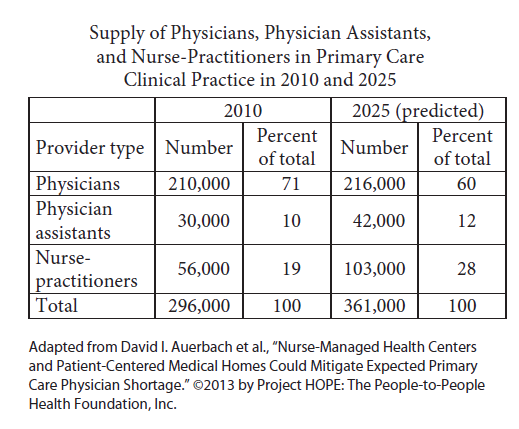 View Solution
View SolutionThe Physician Assistant Will See You Now
23 The term “paramedics” refers to health care workers who provide routine and clinical services.–––––––––––––––––––––––––––––––––––––––––––––––––––––––––––––––––––––––––––––––––––––––––––––––––––––– While the pressures of an aging population, insurance reforms, and health epidemics have increased demand for care, the supply of physicians is not expected to 24 keep pace.––––––––––– The Association of American Medical Colleges predicts a shortage of over 90,000 physicians by 2020, by 2025, that number could climb to more than 130,000. In some parts of the country, shortages are already a sad fact of life. A 2009 report by the Bureau of Health Professions notes that although a fifth of the US population lives in rural areas, less than a tenth of US physicians serves that population. Because a traditionalist response to the crisis— 25 amping up–––––––––––– medical-college enrollments and expanding physician training programs—is too slow and costly to address the near-term problem, alternatives are being explored. One promising avenue has been greater reliance on physician assistants (PAs).
26 By virtue of 27 there–––––– medical training, PAs can perform many of the jobs traditionally done by doctors, including treating chronic and acute conditions, performing minor 28 surgeries: and––––––––––––––– prescribing some medications. However, although well 29 compensated earning in 2012 a median annual salary of $90,930,––––––––––––––––––––––––––––––––––––––––––––––––––––––––––––––––––––– PAs cost health care providers less than do the physicians who might otherwise undertake these tasks. Moreover, the training period for PAs is markedly shorter than 30 those for–––––––––– physicians—two to three years versus the seven to eleven required for physicians.
Physician assistants already offer vital primary care in many locations. Some 90,000 PAs were employed nationwide in 2012. Over and above their value in partially compensating for the general physician shortage has been their extraordinary contribution to rural health care. A recent review of the scholarly literature by Texas researchers found that PAs lend cost-efficient, widely appreciated services in underserved areas. 31 In addition,––––––––––––– rural-based PAs often provide a broader spectrum of such services than do their urban and suburban counterparts, possibly as a consequence of the limited pool of rural-based physicians.
Increasingly, PAs and other such medical practitioners have become a critical complement to physicians. A 2013 RAND Corporation report estimates that while the number of primary care physicians will increase slowly from 2010 to 2025, the number of physician assistants and nurse-practitioners in primary care will grow at much faster rates. 32 Both by merit and from necessity, PAs are likely to greet more 33 patience than––––––––––––––– ever before.
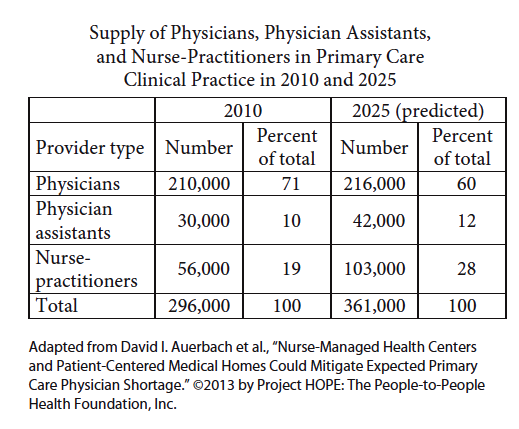 View Solution
View SolutionThe Physician Assistant Will See You Now
23 The term “paramedics” refers to health care workers who provide routine and clinical services.–––––––––––––––––––––––––––––––––––––––––––––––––––––––––––––––––––––––––––––––––––––––––––––––––––––– While the pressures of an aging population, insurance reforms, and health epidemics have increased demand for care, the supply of physicians is not expected to 24 keep pace.––––––––––– The Association of American Medical Colleges predicts a shortage of over 90,000 physicians by 2020, by 2025, that number could climb to more than 130,000. In some parts of the country, shortages are already a sad fact of life. A 2009 report by the Bureau of Health Professions notes that although a fifth of the US population lives in rural areas, less than a tenth of US physicians serves that population. Because a traditionalist response to the crisis— 25 amping up–––––––––––– medical-college enrollments and expanding physician training programs—is too slow and costly to address the near-term problem, alternatives are being explored. One promising avenue has been greater reliance on physician assistants (PAs).
26 By virtue of 27 there–––––– medical training, PAs can perform many of the jobs traditionally done by doctors, including treating chronic and acute conditions, performing minor 28 surgeries: and––––––––––––––– prescribing some medications. However, although well 29 compensated earning in 2012 a median annual salary of $90,930,––––––––––––––––––––––––––––––––––––––––––––––––––––––––––––––––––––– PAs cost health care providers less than do the physicians who might otherwise undertake these tasks. Moreover, the training period for PAs is markedly shorter than 30 those for–––––––––– physicians—two to three years versus the seven to eleven required for physicians.
Physician assistants already offer vital primary care in many locations. Some 90,000 PAs were employed nationwide in 2012. Over and above their value in partially compensating for the general physician shortage has been their extraordinary contribution to rural health care. A recent review of the scholarly literature by Texas researchers found that PAs lend cost-efficient, widely appreciated services in underserved areas. 31 In addition,––––––––––––– rural-based PAs often provide a broader spectrum of such services than do their urban and suburban counterparts, possibly as a consequence of the limited pool of rural-based physicians.
Increasingly, PAs and other such medical practitioners have become a critical complement to physicians. A 2013 RAND Corporation report estimates that while the number of primary care physicians will increase slowly from 2010 to 2025, the number of physician assistants and nurse-practitioners in primary care will grow at much faster rates. 32 Both by merit and from necessity, PAs are likely to greet more 33 patience than––––––––––––––– ever before.
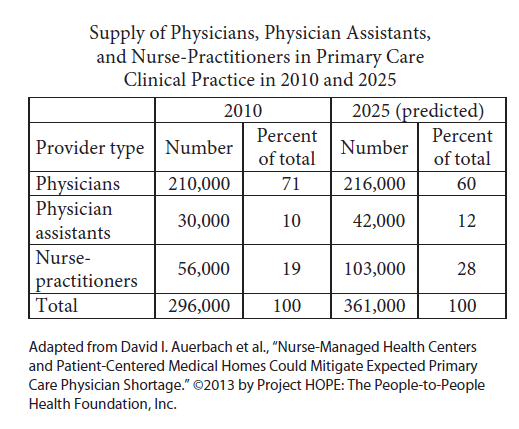 View Solution
View SolutionThe Physician Assistant Will See You Now
23 The term “paramedics” refers to health care workers who provide routine and clinical services.–––––––––––––––––––––––––––––––––––––––––––––––––––––––––––––––––––––––––––––––––––––––––––––––––––––– While the pressures of an aging population, insurance reforms, and health epidemics have increased demand for care, the supply of physicians is not expected to 24 keep pace.––––––––––– The Association of American Medical Colleges predicts a shortage of over 90,000 physicians by 2020, by 2025, that number could climb to more than 130,000. In some parts of the country, shortages are already a sad fact of life. A 2009 report by the Bureau of Health Professions notes that although a fifth of the US population lives in rural areas, less than a tenth of US physicians serves that population. Because a traditionalist response to the crisis— 25 amping up–––––––––––– medical-college enrollments and expanding physician training programs—is too slow and costly to address the near-term problem, alternatives are being explored. One promising avenue has been greater reliance on physician assistants (PAs).
26 By virtue of 27 there–––––– medical training, PAs can perform many of the jobs traditionally done by doctors, including treating chronic and acute conditions, performing minor 28 surgeries: and––––––––––––––– prescribing some medications. However, although well 29 compensated earning in 2012 a median annual salary of $90,930,––––––––––––––––––––––––––––––––––––––––––––––––––––––––––––––––––––– PAs cost health care providers less than do the physicians who might otherwise undertake these tasks. Moreover, the training period for PAs is markedly shorter than 30 those for–––––––––– physicians—two to three years versus the seven to eleven required for physicians.
Physician assistants already offer vital primary care in many locations. Some 90,000 PAs were employed nationwide in 2012. Over and above their value in partially compensating for the general physician shortage has been their extraordinary contribution to rural health care. A recent review of the scholarly literature by Texas researchers found that PAs lend cost-efficient, widely appreciated services in underserved areas. 31 In addition,––––––––––––– rural-based PAs often provide a broader spectrum of such services than do their urban and suburban counterparts, possibly as a consequence of the limited pool of rural-based physicians.
Increasingly, PAs and other such medical practitioners have become a critical complement to physicians. A 2013 RAND Corporation report estimates that while the number of primary care physicians will increase slowly from 2010 to 2025, the number of physician assistants and nurse-practitioners in primary care will grow at much faster rates. 32 Both by merit and from necessity, PAs are likely to greet more 33 patience than––––––––––––––– ever before.
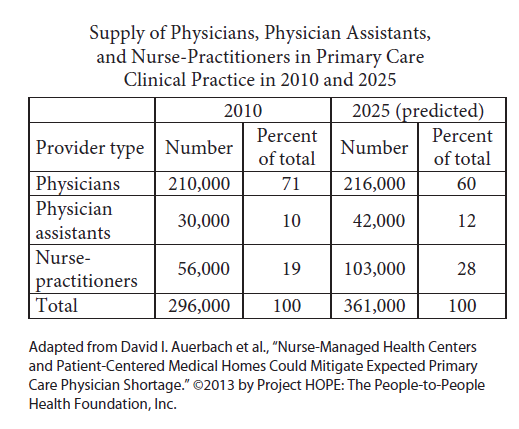 View Solution
View Solution

